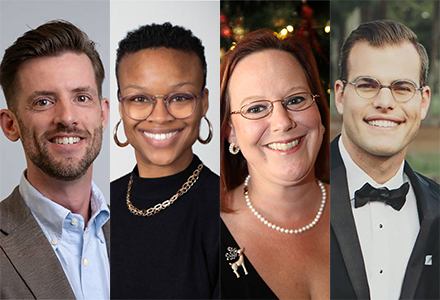
Four faculty members in the Department of Religious Studies at USF — Michael DeJonge,
Shaunesse’ Jacobs Plaisimond, Tori Lockler and Garrett Potts — are pioneering an initiative
to provide religious literacy to health care workers — an endeavor that earned them
a $60,000 grant from Interfaith America (IFA).
“This initiative will transform patient care by ensuring health care providers understand
and respect religious diversity, improving communication between health care providers
and patients from diverse religious backgrounds, reducing health care disparities
related to religious and cultural differences and creating a model for culturally
competent health care delivery that can be replicated nationwide,” said Potts, whose
work focuses on religio-cultural competence, particularly in the areas of health,
business and religion. “This grant is a powerful validation of our department's vision
and work at the intersection of religion and health care. The support from Interfaith
America affirms that our innovative approach to integrating religious literacy into
health care education is not just locally valuable but nationally significant. This
grant provides the resources and recognition needed to transform our vision into reality.”
The two-year Faith & Health Campus Grant will enhance existing courses at USF, enable
the team to develop new curricula exploring the relationship between religion and
health care access and strengthen USF’s partnership with Tampa General Hospital (TGH),
where Lockler and Potts are already working to provide practical training and real-world
application of religious literacy in health care settings.
"We are observing a cultural shift in health care represented, for example, by a recent American Medical Association resolution recognizing the need for education about religion and spirituality in medical school curricula,” said DeJonge, the James F. Strange Endowed Chair of Religious Studies. “Interfaith America is a leader in organizing a response to this need, and our department is at the forefront of delivering in the classroom. USF students training for careers in health care who also educate themselves about religion and spirituality are setting themselves up for success.”
USF is already at the forefront of this cultural shift. The department saw over 700
students enroll in “World Religions for Health care Professionals” last semester.
“Religious and cultural competency is a critical but often overlooked component of
health care delivery,” Potts said. “Our experience shows that understanding patients'
religious and spiritual backgrounds can significantly impact health outcomes. As health
care becomes increasingly diverse, practitioners need the skills to provide culturally
sensitive care that respects and accounts for patients' religious beliefs and practices.”
